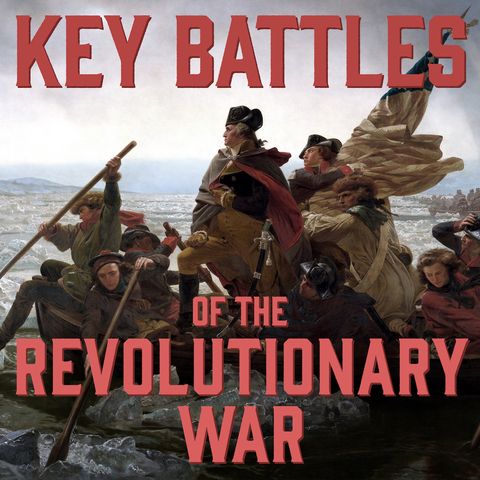Contacts
Info
The Revolutionary War started when a few colonists fired their muskets against the British Empire, then the world's military superpower. It ended—against all reasonable expectations— with an independent American and...
show more
-
Prologue to Key Battles of the Revolutionary War
4 MAR 2020 · A couple of announcements from host Scott Rank. He tells you what this series will be about and where to find his main podcast History Unplugged (http://historyunpluggedpodcast.com).1m 6s -
The World of the American Revolution
5 MAR 2020 · Grab your musket and your portion of rum, Yankee, because we have a war to fight! James Early returns to the History Unplugged Podcast to kick off a massive series called Key Battles of the Revolutionary War. We get in-depth into the battles that determined the outcome of one of the most consequential wars in history. But we also go deep into the background of social, political, cultural, and theological aspects of the of the 18th century. Scott and James kick off this episode by talking about the global-level changes in society that made the Revolutionary War possible in the 1770s, and almost impossible anytime earlier. They have to do with changes in warfare and weapons, government/society, political philosophy, British governing policy, and the American colonies themselves.40m 56s -
Background to the War
6 MAR 2020 · Our series is picking up steam as we jump to the years immediately prior to the Shot Heard ‘Round the World. James and Scott discuss the interregnum between the French-Indian War and the Revolutionary War, the Sugar Act (1764), the Stamp Act (1765), then Townsend Acts (1767), the Boston Massacre (1770), the Tea Act (1773), and the Coercive Acts (1774).51m 45s -
Lexington and Concord
7 MAR 2020 · The Battles of Lexington and Concord were of minor military significance but of world-historical importance in the modern era. They were the first military engagements of the Revolutionary War, marking the outbreak of armed conflict between Great Britain and its thirteen colonies on the North American mainland. Fought on April 19, 1775, the battles of Lexington and Concord ruin British political strategy of ending colonial opposition to the Intolerable Acts and seizing weapons of rebels. Revolutionary leaders such as John Adams considered the battle to be a point of no return: “The Die was cast, the Rubicon crossed,” he said.1h 3m 20s -
Sidetrack Episode: British and Continental Soldiers
8 MAR 2020 · The Continental Army and the British Army were significantly different in their organizational structure, levels of experience, and funding. The Continental Army was an undisciplined, unprepared fighting force with makeshift uniforms and sloppy tactics (at least at the beginning of the war). The British Army was the world’s elite fighting force and fresh of victory of the globe-spanning Seven Years War against France and her allies. What caused the Continental Army to prevail in the Revolutionary War?53m 41s -
Bunker Hill (1/2)
9 MAR 2020 · With the Revolutionary War turning from cold to hot, the British made plans to send troops from Boston to break the Colonials’ siege of that city and occupy the surrounding hills. About one thousand militiamen fortified Breed’s Hill to prepare for the coming onslaught. It was the first serious battle that pitted the fiery but inexperienced colonists against the battle-hardened British.42m 42s -
Bunker Hill (2/2)
10 MAR 2020 · “Don't fire till you see the whites of their eyes!” — famous words, and smart strategy for using terribly inaccurate muskets, but what were the conditions that gave rise to that advice? Find out in this episode, as the Battle of Bunker hill wraps up.49m 32s -
The Quebec Campaign
11 MAR 2020 · The Continental Army thought they could rally the French-speaking residents of Canada in their uprising against the British. Such thinking led to the Quebec Campaign. Although a major defeat for the Americans, it showed the dogged determinism of American commander Benedict Arnold, who also showed his bravery in the Battle of Saratoga before defecting to the British.42m 49s -
The Battle of Quebec
12 MAR 2020 · The Battle of Quebec, fought on December 31, 1775, marked the end of American offensive operations in Canada. General Richard Montgomery was killed, Arnold wounded, and Daniel Morgan and more than four hundred American soldiers taken prisoner. Returning forces of the Continental Army arrived ragged and nearly starved.33m 31s -
Sidetrack Episode: The Declaration of Independence
13 MAR 2020 · In the background of the opening battles of the Revolutionary War, an assembly of colonial statesmen issued a document announcing their formal separation from the British Empire. How did this document come about, what did the British make of it, and how revolutionary were these ideas to an eighteenth-century audience?1h 9m 13s
The Revolutionary War started when a few colonists fired their muskets against the British Empire, then the world's military superpower. It ended—against all reasonable expectations— with an independent American and...
show moreInformation
| Author | Parthenon Podcast Network |
| Categories | Society & Culture |
| Website | www.spreaker.com |
| info@historyonthenet.com |
Copyright 2024 - Spreaker Inc. an iHeartMedia Company
